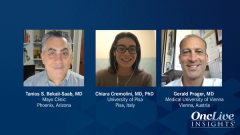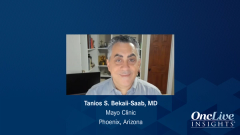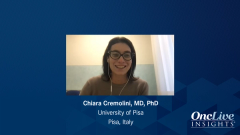
Future Directions for mCRC Management
Gerald Prager, MD; Chiara Cremolini, MD, PhD; and Tanios S. Bekaii-Saab, MD, review emerging strategies and the future treatment landscape for metastatic colorectal cancer.
Episodes in this series

Tanios S. Bekaii-Saab, MD: We’re going to look ahead very briefly. What things are most exciting in the field of metastatic colorectal cancer? Mostly looking at these exciting strategies that are in the works. Perhaps Chiara, and then Gerald.
Chiara Cremolini, MD, PhD: Probably the most exciting data were provided in very limited subgroups of molecularly defined patients, but the targeted approach for the vast majority of patients with metastatic colorectal cancer has failed to date. An important line of research, although those exciting results have not come, is the way of making immunotherapy fix also in microsatellite stable tumors. This is a major issue to give the vast majority of our patients an immunotherapeutic option.
Tanios S. Bekaii-Saab, MD: Gerald?
Gerald Prager, MD: I totally agree. The most exciting recent data for me, or at least also somehow hypothesis generating, was the AtezoTRIBE trial, where you have an aggressive chemotherapy plus bevacizumab…and a checkpoint inhibitor. This partially might be an answer on Chiara’s one million dollar question “How can we make cold colorectal cancer hot?” It’s not so easy that we just put all the active agents together and then add the checkpoint inhibitor. We have to learn from this phase 2 trial. What were the patients having a benefit from this triple chemotherapy plus bevacizumab plus atezolizumab? Do we need more data on bevacizumab combinations with checkpoint inhibitors? These are so many open questions, probably we don’t need TKIs [tyrosine kinase inhibitors] to make these tumors hot. Still, this question is not answered. What TKI do we need? So there are many open questions. We have to learn from these patients most likely by doing rebiopsy, by looking what’s going on from the biological point of view, and then making smart concepts and studying these concepts in clinical trials.
Tanios S. Bekaii-Saab, MD: I totally agree with both of you that this is an exciting time, with a lot of new agents coming down the pike, a lot of agents targeting KRAS. The G12C story is evolving into a very nice story, although we have to combine with EGFR inhibitors to maximize the benefit in colon cancer. G12D is coming, and others—a lot of exciting times for drug development. I want to thank both of my colleagues, Dr. Cremolini and Dr. Prager, for an interesting and enriching conversation. I want to thank also our audience. I hope you found this program informative. Thank you.
Transcript Edited for Clarity









































